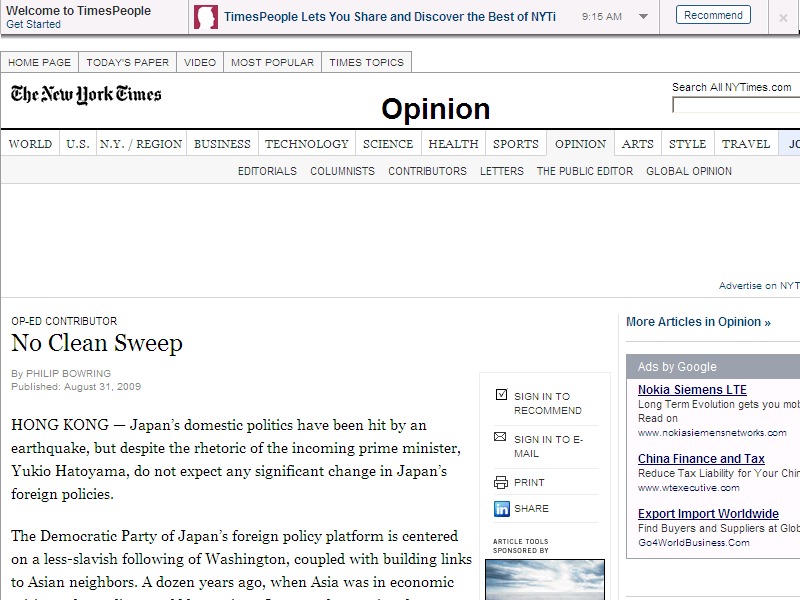| Tweet |

鳩山論文で今話題のNYタイムズ紙だけど日本のマスゴミだけを読んでいる人ならアメリカが非難していると考えると思うけどNYタイムズ紙に行って3秒程度検索すれば「冷静な判断」を書いている記者もいるんだけどそういうのは無視されるのw
日本のマスゴミの世界観は、アメリカだけで永久に対米従属が日本の生きる道だという妄想が今も続いている事の証明なの........要は、民主党を批判したいだけなのがミエミエw

HONG KONG — Japan’s domestic politics have been hit by an earthquake, but despite the rhetoric of the incoming prime minister, Yukio Hatoyama, do not expect any significant change in Japan’s foreign policies.
The Democratic Party of Japan’s foreign policy platform is centered on a less-slavish following of Washington, coupled with building links to Asian neighbors. A dozen years ago, when Asia was in economic crisis, such a policy would have given Japan a clear regional leadership role. But Japan failed to assert itself in the face of U.S. opposition.
Now, however, the situation is far more complex, thanks mainly to the rise of China, as well as the conundrum over North Korea’s nuclear weapons program. There are also contradictions galore in the party’s platform.
The party imagines that because Japan’s trade with China now surpasses its trade with the United States, Tokyo should emphasize the establishment of an East Asian regional economic community. But this assumption fails to recognize that much of Japan’s trade with China, South Korea and Taiwan is in components for products that are then sold in third countries, not least the United States.
The regional community agenda is also at odds with Mr. Hatoyama’s commitment to protect “traditional economic activities” and not to leave areas such as agriculture at the “mercy of globalization.” Criticizing the excesses of U.S.-led globalization is not a good basis for defending protection of domestic industries, which has not only damaged Japan’s own economy but frustrates its avowed intention to create a regional economic bloc.
Even under the Liberal Democratic Party, Japan had been making significant if belated attempts to match Chinese efforts to build regional links, signing up to free trade deals that look good on paper and promoting the role of the Asian Development Bank, in which Tokyo plays the lead role.
Japan also has been pushing for closer cooperation in determining Asian exchange rates at a time when China is stuck with an unconvertible, dollar-linked currency. Moreover, Japan is investing heavily in countries such as Vietnam and Indonesia that it sees as natural allies in balancing China’s growing economic clout.
In some countries, rising fears of China’s goals are now canceling out criticism of the U.S.-led invasion of Iraq and the “war against terror.” Worries about the impact of reduced U.S. demand on the global economy is offsetting resentment of Wall Street-style capitalism.
The Democratic Party of Japan has the laudable goal of strengthening regional institutions to form a basis not simply for economic cooperation but for resolving bilateral disputes, such as Japan’s tensions with China and Korea over the South China Sea. Party officials note the success of the European Union in resolving similar disputes.
The Democratic Party acknowledges that China’s military power will continue to expand. But it has no policy to address this, other than leaving the U.S.-Japan security pact and U.S. nuclear umbrella in place and hoping that China’s rise will remain peaceful. The party assumes that Japan and China can share leadership of an East Asian community in the same way that acceptance of equality between Germany and France was a cornerstone of the European Union. But the prevailing view in China appears to be that “there cannot be two suns in the sky.” For Beijing, the Japanese sun is setting as the Chinese one rises.
For 60 years the Liberal Democratic Party focused on the economy and left defense and foreign policy largely to Washington leadership. Changing that will be more difficult and controversial than the Democratic Party imagines in a rising but increasingly complex East Asia.
|
|
▲このページのTOPへ HOME > 政治・選挙・NHK70掲示板
フォローアップ:- 犬から人間宣言 姉葉大作 2009/9/03 09:40:38
(0)
|
|
投稿コメント全ログ コメント即時配信 スレ建て依頼 削除コメント確認方法
|
|
 題名には必ず「阿修羅さんへ」と記述してください。
題名には必ず「阿修羅さんへ」と記述してください。
掲示板,MLを含むこのサイトすべての
一切の引用、転載、リンクを許可いたします。確認メールは不要です。
引用元リンクを表示してください。
|
|
|
|
|
|
|
|